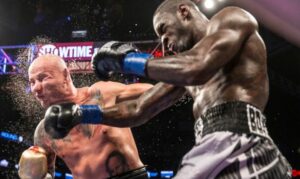It’s a cliché, but maybe WBC champion Deontay Wilder and lineal champion Tyson Fury are more similar than either would care to admit.
Both are outspoken and deeply polarising characters who cite Muhammad Ali as one of their primary inspirations. Both possess unconventional, unorthodox styles and as a result have been subject to scepticism and cynicism at various junctures in their careers – Wilder dismissed as a technically inept ‘windmiller’, Fury derided for being supposedly undisciplined and oafish – only to emphatically defy the odds when it mattered. Both are huge personalities, figuratively and literally. And finally, both are absolutely determined to establish themselves as the undisputed number one, and firmly believe that the winner of their fight on December will be able to do just that.

Familiarity, as the saying goes, breeds contempt, but Wilder and Fury have always shared a complicated relationship – one that has continually fluctuated between mutual respect and heated enmity. This was plainly evident in their three-day transatlantic press tour, where exchanges of pleasantries and good-natured jokes threatened to explode at any minute into shouting matches and physical confrontation. Let’s hope that their December 1st showdown will have a similarly volatile quality.
Ultimately, observers are more interested in the pairs’ differences – as opposed to their similarities – and how these will manifest themselves on fight night. Fury is generally regarded as the superior boxer with the superior skillset, whereas it is almost universally acknowledged that Wilder is the most devastating puncher in the division.

Let’s assume, for a moment, that Fury wasn’t inactive for a couple of years after succumbing to depression and subsequently becoming embroiled in substance abuse controversies – something which many pragmatists, or pessimists depending on how you look at it, are highlighting as a crucial factor in the outcome of this fight.
Three Novembers ago, Fury resoundingly outpointed reigning unified titleholder Klitschko in what was considered a sensational upset. In a messy affair characterised by a lot of holding and posturing, the Mancunian capitalised on his youth and physical advantages, strategically exploiting Klitschko’s safety-first approach in the process, in order to out-throw and outland the champion throughout twelve rounds.

Can we confidently assume that this active 2015 version of Fury would be able to comfortably dispatch of Deontay Wilder in a similar fashion? Maybe we can, but the fact remains that Tuscaloosa’s Bronze Bomber also represents an entirely different – and daresay more challenging – proposition than Dr. Steelhammer.
Unlike his Ukrainian counterpart, Wilder is a bonafide ring predator, if not a ring general in the conventional sense, and is positively merciless when he has an opponent hurt. Wilder is someone who is patently capable of ending, or at least changing, a fight with a single punch and therefore requires a single opportunity over the course of 36 minutes to detonate on his opponent’s chin.

While it can be argued, as Fury has, that this quality in the heavyweight division is not exclusive to Wilder, and that the self-styled ‘Gypsy King’ is capable of nullifying powerful punchers with his slipperiness and upper body movement, it must also be taken into consideration that Wilder is not a deliberate stalker in the mould of a George Foreman; rather he possesses explosive fast-twitch speed to complement the destructive force he carries in both hands.
Wilder understands that Fury’s physical strength, energy, skills and movement probably has the potential to trouble him throughout the early proceedings. Nevertheless, expect the Alabaman’s power to eventually prove decisive in a bizarre yet engrossing spectacle where, like many of his recent fights, Wilder will be conceding rounds to his opponent before Fury’s numerical lead is negated in spectacular fashion, somewhere around the middle rounds.
Article by: Navi Singh
Follow Navi on Twitter at: @DarkMan________